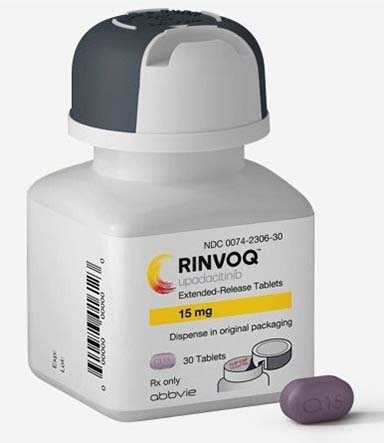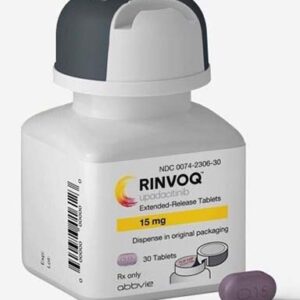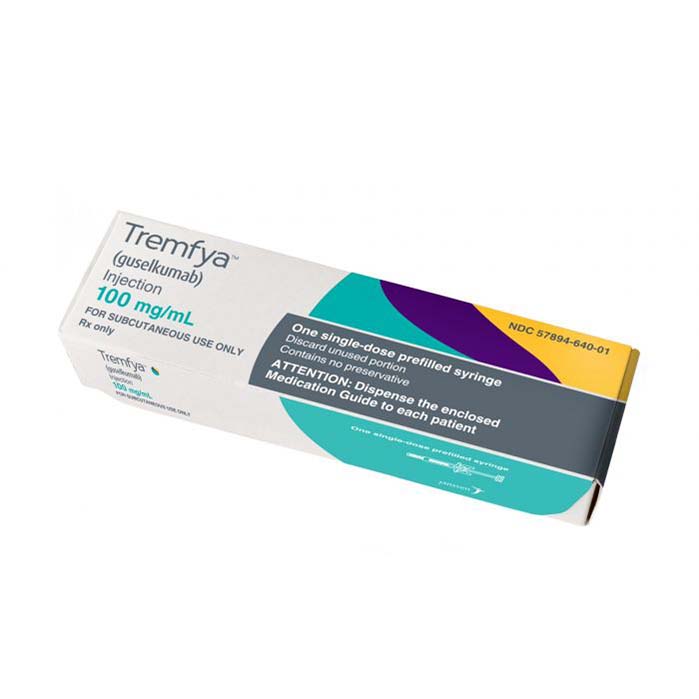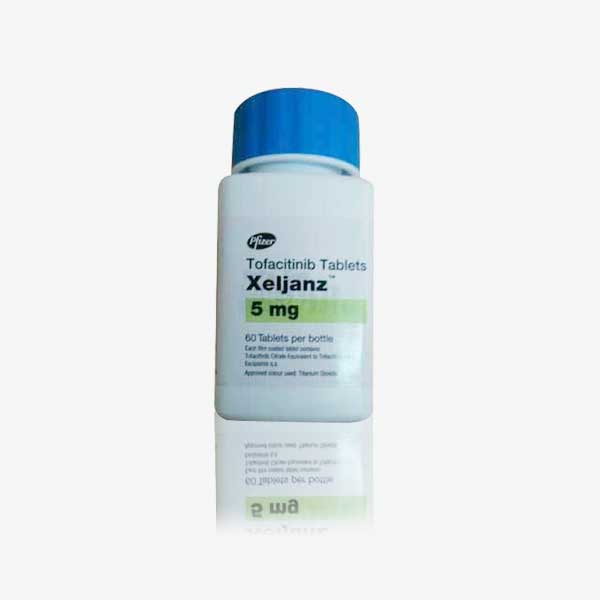

Buy Rinvoq (upadacitinib) Online
$2,007.50
- DISEASE INDICATIONS: Psoriatic Arthritis, Rheumatoid Arthritis
- MANUFACTURER: AbbVie Ltd
- USAGE: Oral
- MEDICINE APPROVED BY:
- European Medical Agency (EMA)
- Food and Drug Administration (FDA)
- Pharmaceuticals and Medical Devices Agency (PMDA)
Rinvoq is a medication with the generic name upadacitinib. It belongs to a class of drugs known as Janus kinase (JAK) inhibitors. This medication is used to treat various autoimmune and inflammatory conditions by targeting the underlying inflammatory processes in the body.

Buy Rinvoq (upadacitinib) Online
$2,007.50
- Description
- Additional information
- Reviews (0)
Description
Rinvoq is a medication with the generic name upadacitinib. It belongs to a class of drugs known as Janus kinase (JAK) inhibitors. This medication is used to treat various autoimmune and inflammatory conditions by targeting the underlying inflammatory processes in the body. Here is a comprehensive description of Rinvoq (upadacitinib):
- Mechanism of Action: Rinvoq works by inhibiting specific enzymes called Janus kinases (JAKs). These enzymes are involved in signaling pathways that regulate the body’s immune response and inflammation. By inhibiting JAKs, upadacitinib helps to reduce the inflammatory response and alleviate symptoms associated with autoimmune and inflammatory diseases.
- Indications: Rinvoq is approved for the treatment of several conditions, including:
- Rheumatoid Arthritis (RA): Rinvoq is used to treat moderate to severe rheumatoid arthritis in adults who have not responded well to other disease-modifying antirheumatic drugs (DMARDs).
- Psoriatic Arthritis (PsA): It is also indicated for the treatment of active psoriatic arthritis, either as a monotherapy or in combination with methotrexate.
- Ankylosing Spondylitis (AS): Rinvoq can be prescribed for the treatment of active ankylosing spondylitis in adults.
- Dosage: The dosage of Rinvoq varies depending on the condition being treated and the patient’s individual health status. A healthcare provider will determine the appropriate dosage and treatment plan.
- Administration: Rinvoq is typically taken orally in tablet form, with or without food. The tablets should be swallowed whole with water.
- Efficacy: Clinical trials have demonstrated that Rinvoq can effectively reduce the signs and symptoms of rheumatoid arthritis, psoriatic arthritis, and ankylosing spondylitis, as well as improve physical function and inhibit structural joint damage in many patients.
- Side Effects: Common side effects of Rinvoq may include upper respiratory tract infections, headaches, and an increased risk of liver enzyme elevations. More serious side effects, such as an increased risk of serious infections or blood clots, may occur and should be monitored by a healthcare provider.
- Precautions: Patients should inform their healthcare provider about their complete medical history, current medications, and any allergies before starting Rinvoq. Regular monitoring and follow-up appointments are essential for assessing the medication’s safety and effectiveness.
- Contraindications: Rinvoq is contraindicated in certain situations, such as during pregnancy or in individuals with active severe infections. It should not be used in combination with certain other medications, and the decision to use it should be carefully considered by a healthcare provider.
- Storage: Rinvoq should be stored at room temperature, away from moisture and direct sunlight, as per the medication’s packaging instructions.
- Compliance: Patients should adhere to their healthcare provider’s recommendations regarding the use of Rinvoq to achieve the best therapeutic outcomes.
Rinvoq (upadacitinib) provides an important treatment option for individuals with autoimmune and inflammatory conditions, particularly when other treatments have proven insufficient. It is crucial to consult with a qualified healthcare provider for a thorough evaluation and a personalized treatment plan before using this medication, as they can provide specific guidance based on individual health needs and circumstances.
Additional information
| Package | 30 extended-release tablets of 15 mg |
|---|
Be the first to review “Buy Rinvoq (upadacitinib) Online” Cancel reply
Related Products




Buy Xeljanz : Tofacitinib 5 mg Tablets Online
Total Sales: 0
SKU: 671928




Reviews
There are no reviews yet.